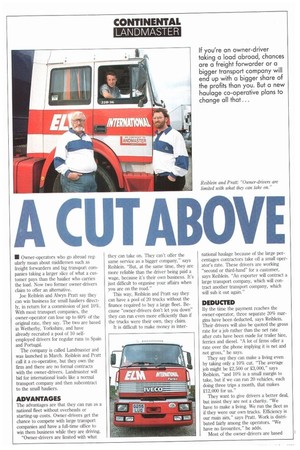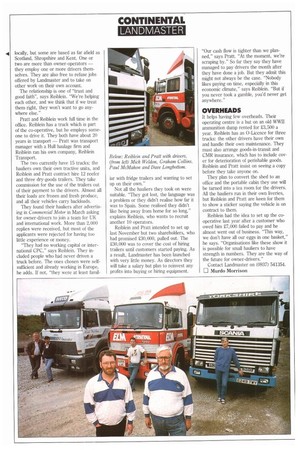CUT ABOVE
Page 56

Page 58

If you've noticed an error in this article please click here to report it so we can fix it.
II Owner-operators who go abroad regularly moan about middlemen such as freight forwarders and big transport companies taking a larger slice of what a customer pays than the haulier who carries the load. Now two former owner-drivers claim to offer an alternative.
Joe Reiblein and Alwyn Pratt say they can win business for small hauliers directly, in return for a commission of just 10%. With most transport companies, the owner-operator can lose up to 60% of the original rate, they say. The two are based in Wetherby, Yorkshire, and have already recruited a pool of 10 selfemployed drivers for regular runs to Spain and Portugal.
The company is called Landmaster and was launched in March. Reiblein and Pratt call it a co-operative, but they own the firm and there are no formal contracts with the owner-drivers. Landmaster will bid for international loads like a normal transport company and then subcontract to the small hauliers.
ADVANTAGES
The advantages are that they can run as a national fleet without overheads or starting-up costs. Owner-drivers get the chance to compete with large transport companies and have a full-time office to win them business while they are driving.
"Owner-drivers are limited with what they can take on. They can't offer the same service as a bigger company," says Reiblein. "But, at the same time, they are more reliable than the driver being paid a wage, because it's their own business. It's just difficult to organise your affairs when you are on the road."
This way, Reiblein and Pratt say they can have a pool of 20 trucks without the finance required to buy a large fleet. Because "owner-drivers don't let you down" they can run even more efficiently than if the trucks were their own, they claim.
It is difficult to make money in inter
national haulage because of the large percentages contractors take off a small operator's rate. These drivers are working "second or third-hand" for a customer, says Reiblein. "An exporter will contract a large transport company, which will contract another transport company, which will sub it out again."
DEDUCTED
By the time the payment reaches the owner-operator, three separate 20% margins have been deducted, says Reiblein. Their drivers will also be quoted the gross rate for a job rather than the net rate after cuts have been made for trailer hire, ferries and diesel. "A lot of firms offer a rate over the phone implying it is net and not gross," he says.
They say they can make a living even by taking only a 10% cut. "The average job might be £2,500 or £3,000," says Reiblein, "and 10% is a small margin to take, but if we can run 20 vehicles, each doing three trips a month, that makes £12,000 for us."
They want to give drivers a better deal, but insist they are not a charity. We have to make a living. We run the fleet as if they were our own trucks. Efficiency is our main aim," says Pratt. Work is distributed fairly among the operators. "We have no favourites," he adds.
Most of the owner-drivers are based locally, but some are based as far afield as Scotland, Shropshire and Kent. One or two are more than owner-operators — they employ one or more drivers themselves. They are also free to refuse jobs offered by Landmaster and to take on other work on their own account.
The relationship is one of "trust and good faith", says Reiblein. "We're helping each other, and we think that if we treat them right, they won't want to go anywhere else."
Pratt and Reiblein work full time in the office. Reiblein has a truck which is part of the co-operative, but he employs someone to drive it. They both have about 20 years in transport — Pratt was transport manager with a Hull haulage firm and Reiblein ran his own company, Reiblein Transport.
The two currently have 15 trucks; the hauliers own their own tractive units, and Reiblein and Pratt contract hire 12 reefer and three dry-goods trailers. They take commission for the use of the trailers out of their payment to the drivers. Almost all their loads are frozen and fresh produce, and all their vehicles carry backloads.
They found their hauliers after advertising in Commercial Motor in March asking for owner-drivers to join a team for UK and international work. More than 2,000 replies were received, but most of the applicants were rejected for having too little experience or money.
"They had no working capital or international CPC," says Reiblein. They included people who had never driven a truck before. The ones chosen were selfsufficient and already working in Europe, he adds. If not, "they were at least famil iar with fridge trailers and wanting to set up on their own."
Not all the hauliers they took on were suitable. "They got lost, the language was a problem or they didn't realise how far it was to Spain. Some realised they didn't like being away from home for so long," explains Reiblein, who wants to recruit another 10 operators.
Reiblein and Pratt intended to set up last November but two shareholders, who had promised £30,000, pulled out. The £30,000 was to cover the cost of hiring trailers until customers started paying. As a result, Landmaster has been launched with very little money. As directors they will take a salary but plan to reinvest any profits into buying or hiring equipment. "Our cash flow is tighter than we planned," says Pratt. "At the moment, we're scraping by." So far they say they have managed to pay drivers the month after they have done a job. But they admit this might not always be the case. "Nobody likes paying on time, especially in this economic climate," says Reiblein. "But if you never took a gamble, you'd never get anywhere."
OVERHEADS
It helps having few overheads. Their operating centre is a hut on an old WWII ammunition dump rented for £3,500 a year. Reiblein has an 0-Licence for three trucks: the other drivers have their own and handle their own maintenance. They must also arrange goods-in-transit and CMR insurance, which has to include cover for deterioration of perishable goods. Reiblein and Pratt insist on seeing a copy before they take anyone on.
They plan to convert the shed to an office and the portable cabin they use will be turned into a tea room for the drivers. All the hauliers run in their own liveries, but Reiblein and Pratt are keen for them to show a sticker saying the vehicle is on contract to them.
Reiblein had the idea to set up the cooperative last year after a customer who owed him 27,000 failed to pay and he almost went out of business. "This way, we don't have all our eggs in one basket," he says. "Organisations like these show it is possible for small hauliers to have strength in numbers. They are the way of the future for owner-drivers."
Contact Landmaster on (0937) 541354. Murdo Morrison




















































































































